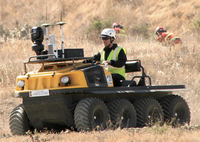ISA-UMA researchers develop a publicly available dataset for research in disaster robotics
 1
/
1
1
/
1

Researchers of the TRUST-BOT project have published the UMA-SAR Dataset, a collection of multimodal raw data captured from a manned all-terrain vehicle in the course of two realistic outdoor search and rescue (SAR) exercises for actual emergency responders conducted in Málaga (Spain) in 2018 and 2019. The sensor suite consisted of overlapping visible light (RGB) and thermal infrared (TIR) forward-looking monocular cameras, a Velodyne HDL-32 3D lidar, as well as an IMU and two GPS receivers as ground truth. ...
Researchers of the TRUST-BOT project have published the UMA-SAR Dataset, a collection of multimodal raw data captured from a manned all-terrain vehicle in the course of two realistic outdoor search and rescue (SAR) exercises for actual emergency responders conducted in Málaga (Spain) in 2018 and 2019. The sensor suite consisted of overlapping visible light (RGB) and thermal infrared (TIR) forward-looking monocular cameras, a Velodyne HDL-32three-dimensional (3D) lidar, as well as an inertial measurement unit (IMU) and two global positioning system (GPS) receivers as ground truth. The dataset captures a wide range of data from the SAR domain, including persons, vehicles, debris, and SAR activity on unstructured terrain. In particular, four data sequences were collected following closed loop routes during the exercises, with a total path length of 5.2 km and a total time of 77 min. Additionally, we provide three more sequences of the empty site (i.e., pre-exercise or post-exercise) for comparison purposes (an extra 4.9 km and 46 min).
The review of previously published disaster robotics repositories indicates that this dataset can contribute to fill a gap regarding visual and thermal datasets and can serve as a research tool for cross-cutting areas such as multispectral image fusion, machine learning for scene understanding, person and object detection, and localization and mapping in unstructured environments.
The full dataset is publicly available for the research community: www.uma.es/robotics-and-mechatronics/sar-datasets. A complete description of the dataset can be found in the IJRR article: https://doi.org/10.1177/02783649211004959.







